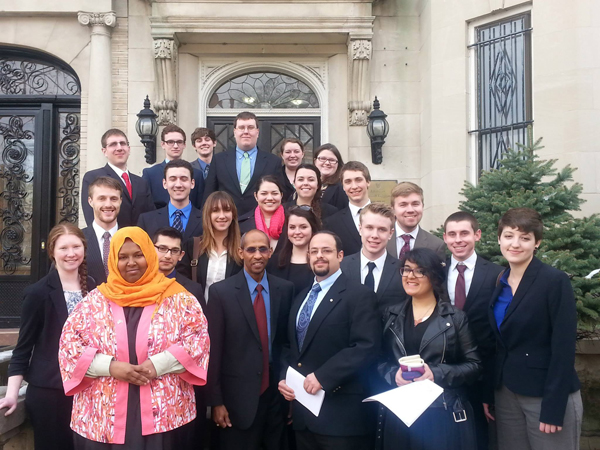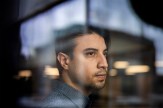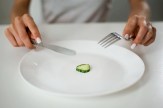Northeastern’s new top ‘Model’

A team of 25 Northeastern students placed first in the 31st annual National University Model Arab League Conference in Washington, D.C. last month, besting delegations from two dozen colleges and universities in Canada, Egypt, and the United States.
The team’s first-place finish in the nation’s capital is the latest achievement in a highly successful 2013-2014 season, during which the Model Arab League club placed first at the northeast regional conference and second at the southeast regional conference.
At the simulation in D.C., each student team represented a pre-assigned member state of the Arab League. The proceedings mirrored those of the 59-year-old political organization, with students sitting on committees and discussing, debating, and writing resolutions on today’s most pressing issues in the Arab states.
Northeastern students represented Sudan. Of the 22 who competed, 21 received awards, including both council chairs.
Brie Barbaro, SSH’14, was named the outstanding delegate on the political affairs committee, where she devised solutions to the civil war in Syria. She attributed the success to intense preparation, for which she spent several hours per week reading policy statements, writing mock resolutions, and debating the issues in the university’s Model Arab League class and club.
“We are really well researched,” said Barbaro, a fifth-year international affairs major. “We are able to speak confidently and authoritatively about very technical topics.”
Stephanie Leahy, SSH’16, agreed with Barbaro’s assessment of the team’s success. “We perform so well because we have such extensive practice and mock debates each week,” said Leahy, a third-year political science major who served as the team’s head delegate. “We approach the conference in a very professional manner and look at the competition as an opportunity to show people what we know.”
The Model Arab League club is one component of the university’s International Relations Council, a student group for those interested in foreign policy, international affairs, and effective debate. Through participation in interactive simulations of the League of Arab States as well as NATO and the United Nations, IRC members discover the challenges of international diplomacy while developing strong public speaking and negotiation skills.
Northeastern’s first-place finish in the national competition marked the 10-year anniversary of the appointment of Philip D’Agati as the team’s faculty adviser. D’Agati, an assistant academic specialist in the Department of Political Science who co-chairs the council’s committee on emergent leaders, praised the university’s Model Arab League program, noting that it “provides students the opportunity to synthesize complex questions, policy interests, and real world issues into implementable policy solutions.”
The program, he added, “opens the door to many leadership opportunities, which build off the experiences the students have in the Model Arab League and strengthen the students’ abilities to perform in all sorts of circumstances.”
Take Barbaro, for instance, whose experience has helped shape her career path. Last month, she passed the Foreign Service exam, the first step to fulfilling her dream of becoming an officer. Next fall, she will enroll in Northeastern’s one-year master’s program in security and resilience studies.
“Being part of the Arab League program enabled me to gain a lot more confidence in my public speaking ability and has developed my leadership capacity in the club and in a room full of unknown people,” she said. “I now have so much more confidence in my ability to represent a country, which is necessary if I want to succeed in the Foreign Service.”





